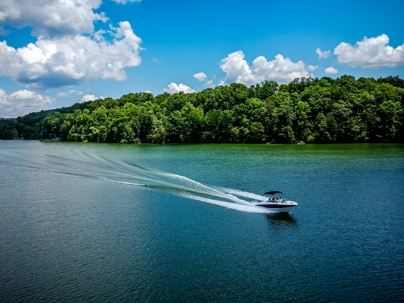Connecticut’s lakes, rivers, and shoreline offer some of the best boating in New England. Whether you're casting a line, cruising with family, or enjoying a peaceful day on the water, safety should always come first. Boating accidents are often preventable, and proper preparation can make all the difference.
Here are some key tips to help ensure every outing is safe and enjoyable.
1. Get Certified
Connecticut law requires anyone operating a boat to complete a state-approved boating safety course and carry a Safe Boating Certificate (SBC). These classes cover essential topics including navigation rules, handling emergencies, and understanding local waterway regulations. If it’s been a while since your last course, consider a refresher. It could save a life.
2. Life Jackets Save Lives
There must be a properly fitting, Coast Guard-approved life jacket for every person on board. Children 12 and under must wear theirs at all times while the boat is underway—no exceptions. Adult passengers should also wear them, especially in smaller boats or during rough weather. Jackets should be easily accessible, not buried in a storage compartment.
3. Watch the Weather
Connecticut’s weather can turn quickly, especially on open water. Always check the forecast before heading out. If there’s a chance of thunderstorms, high winds, or rough water, wait it out. Getting caught in a storm can turn a relaxing day into a dangerous one.
4. Keep Your Boat in Top Shape
Mechanical issues on the water can create serious risks. Before launching, inspect your boat: check the engine, fuel levels, battery, bilge pump, and steering. Make sure your navigation lights work, and confirm that fire extinguishers, signaling devices, and flotation devices are on board and in good condition.
5. Know the Rules of the Water
Boating isn’t a free-for-all. Just like driving, there are rules to follow. Learn how right-of-way works between different types of vessels, understand channel markers, and follow speed limits near docks, beaches, and other boats. These rules are in place to prevent collisions and protect everyone on the water.
6. Stay Sober
Operating a boat while under the influence is not only illegal—it’s a leading cause of boating accidents. Alcohol impairs judgment and coordination, and the effects can be amplified on the water due to sun, wind, and fatigue. Connecticut takes boating under the influence (BUI) seriously, and penalties are steep. Save the drinks for the dock.
7. Watch for Submerged Hazards
Even familiar waterways can change with the seasons. Heavy rain or drought can move or expose rocks, stumps, or debris just beneath the surface. These hidden obstacles can cause serious damage to your boat—or worse. If you're boating in a new area, talk to local marinas or bait shops, check charts, and use sonar if available.
8. File a Float Plan
Let someone on land know your plans. Tell them where you’re going, who’s with you, when you plan to return, and what kind of boat you’re using. If something goes wrong, that information could be critical for rescue teams. It’s a simple habit that adds a significant layer of protection.
9. Bring the Right Gear
A little preparation goes a long way. Pack a first-aid kit, drinking water, extra snacks, sunscreen, a flashlight, and a basic tool kit. Also consider a waterproof map, marine radio, or backup phone charger. The goal is to be ready if something unexpected happens while you’re out on the water.
Enjoy the Water, But Make Safety the Priority
Boating in Connecticut can be a relaxing and memorable experience—especially when everyone comes home safe. By staying alert, respecting the rules, and planning ahead, you can enjoy all the beauty our waterways have to offer without unnecessary risk.
Stay safe, and enjoy the ride.
RisCassi & Davis is Ready to Help
If you or a loved one is ever injured in a boating accident, know that the Connecticut personal injury lawyers at RisCassi & Davis have assisted people injured in these accidents for over 70 years. We have also received meaningful state and national recognition for our work in this area of the law. If you are ever in a boating accident of any kind and would like a free consultation with one of our Connecticut personal injury lawyers, please contact us. There is no obligation.

